- Budget 2025
- post budget reaction
- auto industry
- EV
- leaders
- manufacturing sector
- automotive
- production
- engineering
- mechanical
- electrical
- electronics
Union Budget 2025-26: A Game-Changer for Electric Mobility, Start-ups And MSMEs
- By Gaurav Nandi
- February 04, 2025

The Union Budget 2025-26 has been widely welcomed by industry leaders, particularly for its transformative impact on the electric mobility and start-up ecosystems. Key highlights include the exemption of basic customs duty (BCD) on 35 capital goods critical for EV battery manufacturing and tax exemptions on essential materials like lithium and cobalt, significantly lowering production costs and promoting local supply chains.
The budget also emphasised boosting the MSME sector through increased credit access and skill development, alongside measures supporting startups, gig workers and cleantech manufacturing. Investments in infrastructure, public-private partnerships and tax relief for the middle class are expected to stimulate consumer spending and economic growth.
Overall, the budget is seen as a strong step toward making India a global leader in sustainable mobility, innovation and self-reliant manufacturing.
Partner and Automotive Tax Leader at EY India Saurabh Agarwal noted, “The proposed income tax cuts could boost the middle class's spending power, potentially increasing demand for two-wheelers, three-wheelers, and small cars. Further, the government's commitment to fostering a sustainable automotive ecosystem is clearly demonstrated through its strategic initiatives, which are poised to deliver substantial benefits to the EV industry. The budget astutely emphasizes the complete exemption of Basic Customs Duty (BCD) on cobalt powder and waste, scrap of lithium-ion battery, lead, zinc, zirconium, copper, etc. These pivotal measures are designed to ensure a reliable domestic supply of essential critical minerals for manufacturing and to stimulate job creation across India.”
The Central Government has significantly increased budgetary allocations with PME E-Drive receiving INR 40 billion, auto PLI being bolstered by INR 22.18 billion and advanced chemistry cell PLI benefiting from an infusion of INR 1.55 billion.
Commenting on the newly introduced budget, Mercedes-Benz India Managing Director Santosh Iyer said, “India has long been regarded as a niche garden with high fences; however, this budget is expected not only to enrich the garden by stimulating consumption and strengthening MSME sector, but also lowering the fences through tariff rationalisation and adoption of international practices on transfer pricing, with a clear commitment to enhanced global trade integration. This will send a strong positive signal to the industry, reinforcing confidence in the ‘India Growth Story’, paving the way for sustained investment and future expansion. The announcement of setting up of National Manufacturing Mission’s for clean technology manufacturing and support to domestic EV battery manufacturing is a positive step towards strengthening EV ecosystem. We also welcome the setting up of a high-level committee to evaluate regulatory reforms which will enhance ease of doing business in long term.”
Volkswagen India Brand Director Ashish Gupta, averred, “The Union Budget presents a forward-thinking roadmap for strengthening India’s manufacturing ecosystem with a clear emphasis on clean technology, skill development and infrastructure growth. By prioritizing these areas, along with manufacturing, India is advancing toward a circular economy—where investments, innovation, and sustainable practices drive long-term growth. Infrastructure growth through public-private partnerships and capital expenditure incentives will pave the way for India to become a globally competitive manufacturing hub.”
Commercial vehicle players have also lauded the budget. Ashok Leyland Executive Chairman Dheeraj Hinduja noted, “The finance minister has presented a clear, growth-driven budget that aligns with the Prime Minister’s vision of fostering a competitive and resilient India with inclusive growth by investing in people, economy and innovation. Additionally, the government's strong commitment to green mobility is expected to create new avenues for innovation and growth across the country.”
Daimler India Commercial Vehicles Managing Director Satyakam Arya iterated, “The Union Budget 2025-26 will be a game changer for India and the mobility sector, helping us become a global leader in EV manufacturing and sustainable transportation. The emphasis on localising battery production will create technological advancements and generate more jobs. Also, with mining identified as one of the six domain areas for transformative reforms and the introduction of the State Mining Index, we see major growth potential for the sector in the coming years.”
EKA Mobility Chairman Sudhir Mehta said, “These different programmes demonstrate a strong commitment to sustainability, innovation and greater industrial competitiveness, setting the framework for transformative progress in a variety of critical sectors. The nation's energy revolution will be dependent on funding for small modular reactors and the government's target of 100 gigawatts of nuclear power by 2047. Long-term growth can be solidified by financial agreements that allow governments to expand their borrowing capacity, as well as indirect taxation initiatives targeted at increasing domestic value creation.”
Two-wheeler industry
In a move to avoid protectionist signals, the government has reduced import duties on high-end motorcycles. This decision aligns with India's commitment to lowering trade barriers and could influence the premium motorcycle segment.
With electric mobility remaining the focus point of the automotive sector, the budget has made pivotal efforts for bolstering manufacturing. Drawing on that, companies operating in the EV two-wheeler space has welcomed the developments with open arms.
Kolkata-based Motovolt Mobility Founder Tushar Choudhary said, “"The recent budget has delivered a promising outlook for India’s electric vehicle industry, especially with the reduction in BCD on capital goods related to EV manufacturing. This move will help lower production costs, making EVs more affordable for consumers and encouraging higher sales. Aligned with the National Manufacturing Mission, the budget’s focus on rationalising customs tariffs signals the government's intent to localize high-value production and reduce dependency on imports. Additionally, the exemption on critical minerals like lithium is a significant step toward easing the supply of vital components for EV batteries, further lowering costs and boosting domestic manufacturing. Efforts to localize EV components like batteries, motors and controllers will help reduce upfront costs which would further strengthen India’s EV Ecosystem giving the EV sector the ability to penetrate the Indian markets.”
Chennai-based high performance EV two-wheeler manufacturer Raptee HV’s Co-founder Dinesh Arjun said, “The Finance Minister’s focus on nurturing and investing in innovation is a commendable step toward accelerating new technologies that will shape our future. The allocation of a Deep Tech Fund will further strengthen India’s industrial ecosystem, fostering a globally competitive, tech-driven economy.”
Drawing on the same lines, Revamp Moto Chief Executive Officer Pritesh Mahajan said, “"The National Manufacturing Mission’s support for clean tech manufacturing is a game-changer for India's sustainable future. I firmly believe that this initiative will accelerate the growth of domestic EV battery and solar panel production, reducing our reliance on imports while strengthening India's position as a global leader in green technology. The additional INR 100 billion investment underscores the government’s commitment to fostering innovation, job creation and energy security.”
Welcoming the budget, Odysse Electric Founder Nemin Vora said, “We appreciate the Union Budget 2025, which underscores the government's commitment to fostering economic growth and empowering citizens. The adoption of progressive policies, particularly within the existing tax framework, is a key step in enhancing disposable income and driving consumer spending. This decision will significantly impact consumer-driven sectors, especially the two-wheeler industry. With more disposable income in the hands of consumers—particularly the middle class—purchasing power is set to rise. As a result, more individuals will be encouraged to invest in personal mobility solutions like two-wheelers.”
Associates talk
The boost towards electric mobility is also poised to impact the entire ecosystem. DriveX Founder Narain Karthikeyan noted, “The 2025 Budget is a strong step towards inclusive economic growth, bringing significant benefits across all sections of society. The increase in MSME turnover limits, along with enhanced credit access and intensive skill-development programmes will fuel entrepreneurship, business expansion and youth employment. We also welcome the government’s recognition of the gig economy, with steps to regularise support for gig workers and improve their access to credit facilities. With enhanced credit guarantee cover for MSMEs and startups, particularly in focus sectors crucial for Atmanirbhar Bharat, the budget lays a strong foundation for sustained growth and economic resilience.”
Commenting on the same lines, Taabi Mobility Limited Chief Executive Officer Pali Tripathi said, “The transformation of India Post into a large-scale logistics network, along with greater accessibility to PM Gati Shakti data for the private sector, will significantly enhance connectivity, particularly in hinterland regions. These initiatives will drive smarter freight management, optimise last-mile delivery, and make transportation more seamless and sustainable.”
On the aggregator front Rapido Chief Financial Officer Vivek Krishna said, “The Union Budget 2025-26 has proposed a review of both financial and non-financial sector regulations that are expected to help businesses perform better with lesser compliances. It reflects a bold vision for Viksit Bharat, one that empowers the gig economy, promotes sustainable mobility, and catalyses digital innovation. We welcome the social security scheme and healthcare support announced for gig workers. The e-shram portal registration and the PM Jan Arogya Yojana will be a game-changer in prioritising the well-being of gig workers, including our captains. It’s also encouraging to see the government’s effort in promoting green mobility by incentivising local EV component manufacturing.”
Alluding to how the manufacturing push will bolster the electric mobility segment, Kinetic Engineering Managing Director Ajinkya Firodia said, “These steps noted in budget will significantly enhance India’s position as a global hub for electric mobility and clean energy technologies. In addition, the focus on expanding charging infrastructure, incentivising electric buses for public transport and ramping up domestic battery production marks a decisive move in India’s EV revolution. The continued subsidies under the FAME scheme will make EVs more affordable and accessible to consumers. This strong policy push not only paves the way for rapid adoption of EVs but will also create jobs, reduce dependence on fossil fuels and position India as a global leader in sustainable transportation.”
Drawing on the same lines, Tata Technologies Managing Director Warren Harris said, “The establishment of five National Centres of Excellence for Skilling is a pivotal move in building a future-ready workforce. This initiative resonates with our commitment to engineering a better future for India's youth through investment in in-demand training programs across Industry 4.0, IoT, and advanced manufacturing and collaborating with state governments to upgrade ITIs into technology hubs.”
TapFin Co-founder Aditya Singh said, “The budget’s emphasis on cleantech manufacturing, including incentives for electric vehicle batteries and the additional 10 GW support for grid-scale batteries, signals a significant shift for India’s electric mobility sector. Strengthening domestic production will foster innovation, reduce dependence on imports, and open new growth opportunities.”
Image for representative purpose only
- IAC India
- Lumax Group
- IAC Group
- Mahindra
- VECV
- Maruti Suzuki India
- Skoda
- Volkswagen
- Stellantis
- Sunil Koparkar
IAC India Bets On Engineering Depth & Diversification, Targets 20% CAGR Growth Till FY2030
- By Nilesh Wadhwa
- February 28, 2026

Sunil Koparkar, Managing Director, IAC India, outlines the company’s strategy to reduce customer concentration, expand exports and leverage group synergies following its integration with the Lumax Group.
As India’s automotive interior market evolves towards premiumisation, localisation and faster product cycles, IAC India, part of the Lumax Group, is repositioning itself beyond a single-customer dependency model – without diluting its core partnerships.
IAC India continues to derive a significant share of its revenue from Mahindra’s passenger vehicle business. While the concentration remains high, Koparkar is clear that diversification will be driven through growth rather than dilution.
“Mahindra will always be our primary customer. We have a very strong strategic partnership. But we are also working on expanding with other OEMs and in the commercial vehicle space. Our goal remains a 20 percent CAGR,” he says.
For FY2025, IAC India USD 140 million in revenue, and is targeting a 20 percent growth in FY2026. The company counts Mahindra as its primary customer with almost 78 percent of its business coming from them, while Maruti Suzuki India (12%), Volvo Eicher Commercial Vehicles (5%), Skoda-Volkswagen (3%) and Stellantis (1%) contribute towards the remaining business.
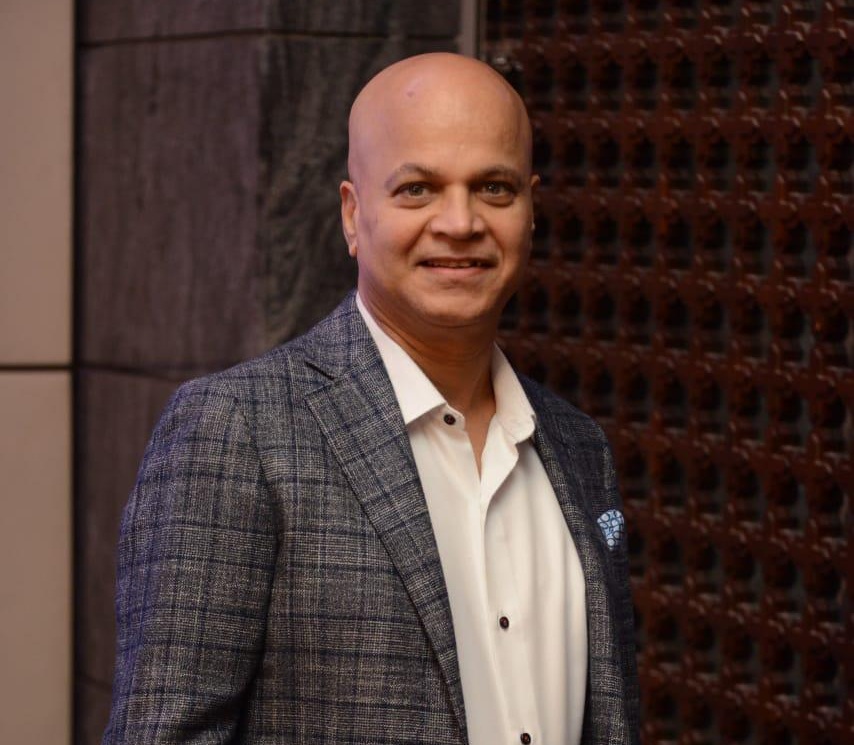 What’s more, responding to the company’s expansion plans, Koparkar revealed, that IAC Group, in addition to introducing new products, is also in talks with new-age players who have just entered Indian market (and also planning too) for supplying products.
What’s more, responding to the company’s expansion plans, Koparkar revealed, that IAC Group, in addition to introducing new products, is also in talks with new-age players who have just entered Indian market (and also planning too) for supplying products.
Currently, passenger vehicles account for roughly 90 percent of the business, with commercial vehicles forming the balance. Value-wise, Koparkar expects CV contribution to rise, even if percentage splits remain broadly similar due to the rapid growth of PV volumes.
Responding to a query on the potential growth from the CV segment, Koparkar said, “There is clear potential in CV interiors. As the CV market moves towards more comfortable cabins — with features like airbags, HVAC and infotainment — the opportunity for interior suppliers increases. Through Volvo Eicher, we have already helped drive that trend in India.”
When asked about the company’s expansion plans, Koparkar also stated that IAC Group is open to expanding to new regions as it aims to operate closer to its customers. One of the potential new projects for the company could very well be Chennai, as the company is in early talks with a new CV customer as well as VinFast.
Engineering as a Standalone Growth Lever
A key pillar of IAC India’s strategy is its expanding engineering capability. The company has been scaling up its R&D and product development team and increasingly positioning engineering services as a distinct revenue stream.
The company at present, employs over 300 engineers in India, which it aims to scale it upto 400-plus by next year and 500-plus in the coming few years.
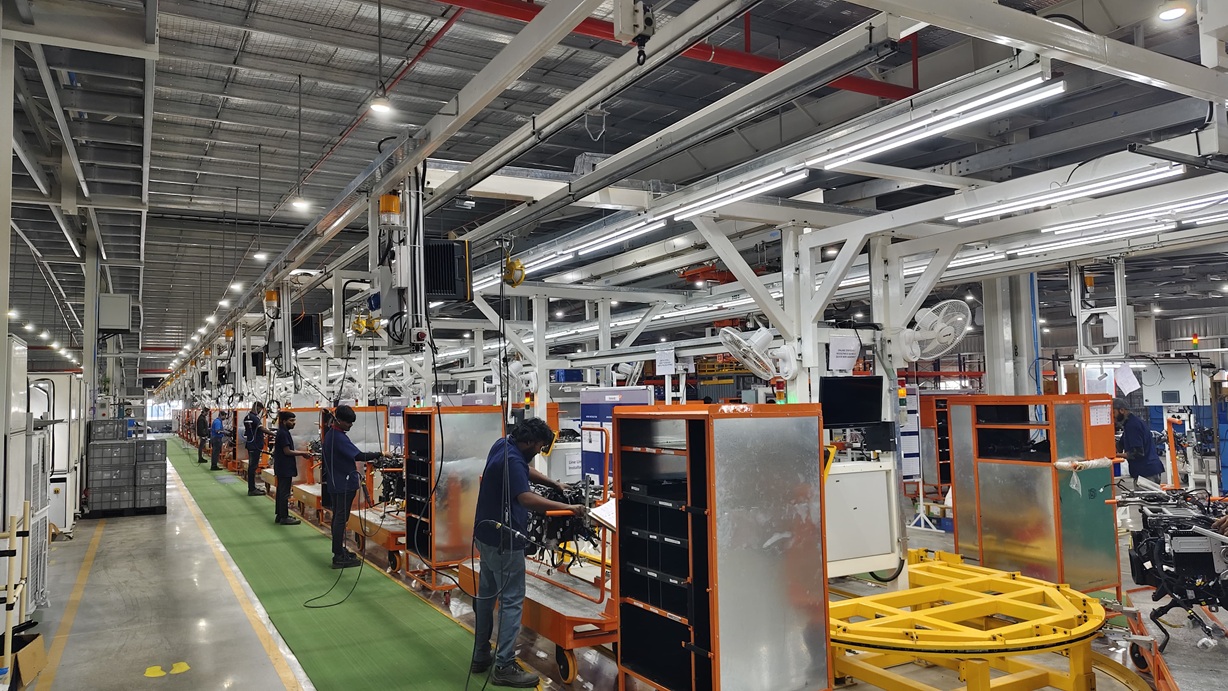
Historically, the Indian Engineering Centre supported the global IAC Group. “We were primarily the IAC Group engineering development centre. We will continue to provide those services. But now, besides global support, we are also offering engineering services to local OEMs,” Koparkar explains.
These services span studio collaboration, basic product design, CAE analysis and prototype development. In some cases, this can potentially evolve into full-scale supply programmes.
Importantly, innovation is now being formalised locally. “This year alone, we are in the process of filing about 30 patents,” he says. Earlier, intellectual property was subsumed under the global entity; now, filings are being initiated in India.
R&D investment remains aligned with group benchmarks at around 1.5–2 percent of revenue.
Exports: Measured Ambition
In terms of export potential, it currently contributes less than 5 percent towards the revenue, primarily through smaller kinematic parts. Direct exposure to the US market is negligible.
“Tariff-related uncertainty does not affect us because we do not export to the US,” Koparkar says. “Logistically, it does not make sense to ship our large interior parts there.”
Europe remains the primary export target. “The opportunity lies in leveraging our design capabilities and local development strengths. If logistics can be managed efficiently, there is room to grow.”
He also sees the Lumax Group’s aftermarket division as a future vehicle for export expansion.
Localisation and Supply Chain Resilience
On the localisation front, IAC India has made significant progress. “Last year was the first time we were able to localise over 99 percent of our tooling and development in India,” Koparkar states. Machinery on shop floors is largely localised, with only certain raw materials still imported.
The semiconductor crisis, he adds, had minimal direct impact. “We do not source electronics for our products — that is handled by the customer. However, from a development perspective, we are evaluating secondary substitutes for imported components, so we are prepared in case of disruptions.”
Premiumisation, Sustainability and AI
Premiumisation is currently the dominant interior trend. “Customers are moving away from basic plastics to more premium-feel interiors. Electronification is a big driver,” Koparkar says.
Sustainability, however, remains nascent in India. “There is no specific push for sustainable materials yet. What OEMs are looking for is lightweighting to meet upcoming CAFE norms. If a sustainable material delivers significant weight reduction, then it becomes serious.”
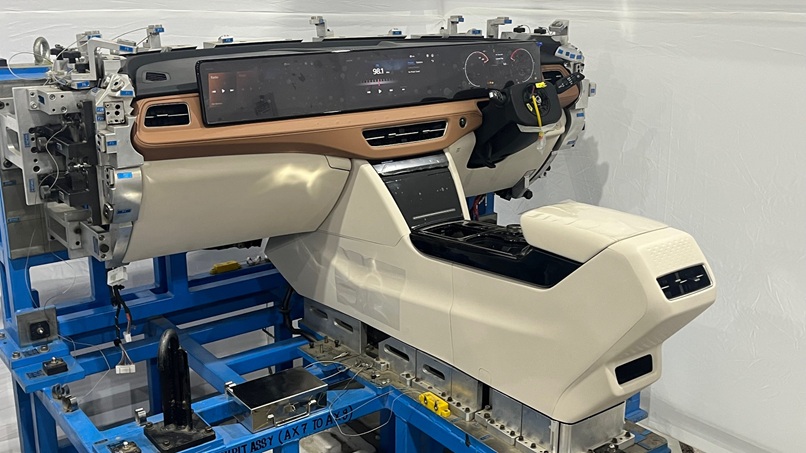
He points to jute, coir and bamboo fibres as potential alternatives but stresses that ecosystem-level collaboration is essential. “Unless a circular economy develops around us, sustainable materials will struggle to scale.”
On automation, operations across IAC’s six plants are roughly a 50:50 mix of automated and manual processes, depending on volume justification. Cobots and semi-automation are used where full automation does not offer viable returns.
AI, meanwhile, is expected to influence design more than manufacturing. “We see AI helping us accumulate design learnings and reduce design cycle times. Its impact will be more visible in engineering services than on the shop floor.”
Faster Development Cycles
Product life cycles are shrinking rapidly. “It used to take five years to develop a car,” Koparkar reflects. “With the XUV700, we worked with the customer to shrink that to 42 months. EVs are being developed even faster.”
As development timelines compress and interiors become more technology-intensive, IAC India is betting on engineering depth, localisation strength and group synergies to sustain its 20 percent growth ambition – while steadily broadening its customer and geographic footprint
- Rosmerta Technologies
- The Curious Bunch
- CII National Conclave on Road Safety
- Dr Rajesh Mohan
- Ravi Krishnamoorthi
- road safety
Rosmerta Launches Road Safety Comic Book For Schools
- By MT Bureau
- February 27, 2026
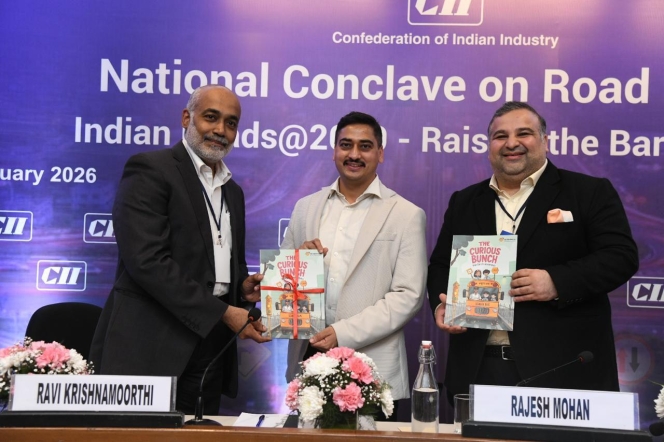
Rosmerta Technologies has launched a comic book titled ‘The Curious Bunch’ at the 3rd Edition of the CII National Conclave on Road Safety. The publication is designed to introduce road safety awareness to children.
The initiative aligns with the Government of India’s ‘4E’ strategy for road safety, which focuses on Engineering, Education, Enforcement and Emergency Care. The comic book aims to address the 168,000 road fatalities reported in India in 2022 by fostering safe habits at a school level.
The comic book uses illustrations to present road scenarios, including pedestrian conduct, school bus safety, traffic signals & the use of helmets, seatbelts and child restraint systems. By educating children, the company intends to influence the behaviour of parents and the wider community.
Rosmerta, a provider of mobility solutions, currently operates technology systems for automated driving tests and AI-based monitoring. The launch of ‘The Curious Bunch’ marks an expansion of its activities into the education pillar of the national safety framework.
Dr Rajesh Mohan, DCP, Gurugram Traffic, said, “When we educate children and instil strong moral and ethical values, the impact travels far beyond the classroom. Children naturally share what they learn. They question, they explain, and they influence conversations at home. In many ways, they become powerful advocates, encouraging their parents to be more aware, more responsible, and more engaged. Over time, this awareness translates into action, because parents are also drivers, commuters, and decision-makers on the road.”
Ravi Krishnamoorthi, Group President, Rosmerta Technologies, said, “Every road accident statistic hides a parent’s anxiety. In 2022 alone, India reported over 168,000 road accident fatalities, according to government data. Road safety is not merely about compliance; it is about compassion and collective responsibility. When a child understands why a red light matters or why a helmet can save a life, they don’t just learn a rule - they become ambassadors of safety within their families and communities. Through ‘The Curious Bunch’, we aim to nurture this awareness early, because the habits we shape in children today will define the safety culture of our nation tomorrow.”
- Maruti Suzuki India
- Transport Department of Tamil Nadu
- Automated Driving Test Tracks
- ADTT
- M K Stalin
- RTO
- CMVR
- Rahul Bharti
Maruti Suzuki Commissions Seven Automated Driving Test Tracks In Tamil Nadu
- By MT Bureau
- February 27, 2026
Maruti Suzuki India, in partnership with the Transport Department of Tamil Nadu, has announced the commissioning of seven Automated Driving Test Tracks (ADTTs) in the state. The facilities were inaugurated by the Chief Minister of Tamil Nadu, M K Stalin.
The tracks are located at Regional Transport Offices (RTOs) in Coimbatore (Central), Tiruvannamalai, Krishnagiri, Madurai (North), Sivagangai, Dindigul, and Tiruchirappalli (West). These sites form part of a Memorandum of Agreement to automate ten tracks across the state, with the remaining three at Tirunelveli, Tuticorin and Marthandam scheduled for operation shortly.
The ADTTs are designed to evaluate applicants for two-wheeler and Light Motor Vehicle (LMV) licences. The system removes human intervention from the evaluation process to ensure objective testing according to the Central Motor Vehicle Rules (CMVR).
Key technical components include:
- Video Analytics: High-definition cameras to monitor vehicle movement and path adherence.
- Sensors: Radio Frequency Identification (RFID) and Harnessing AutoMobiles for Safety (HAMS) technology.
- Identification: Face-recognition systems to verify candidate identity.
- Results: Integrated IT systems that generate test results automatically based on real-time data.
The carmaker has commissioned 56 ADTTs across eight states, including Uttar Pradesh, Delhi, and Bihar. Following the completion of agreements with Rajasthan and Andhra Pradesh, the company’s footprint is expected to reach 81 tracks nationwide.
Rahul Bharti, Senior Executive Officer, Corporate Affairs, Maruti Suzuki India, said, “As part of Maruti Suzuki’s road safety initiatives implemented across multiple states, we are partnering with the Government of Tamil Nadu to strengthen the driver licensing evaluation process through the deployment of 10 Automated Driving Test Tracks (ADTTs). Equipped with high-definition cameras and advanced analytics, these ADTTs enable a comprehensive, efficient, and transparent assessment process. It eliminates any human bias and ensures that only skilled drivers are awarded a license.”
“According to data shared by the Ministry of Road Transport & Highways, India witnessed 1.77 lakh road accident deaths in 2024. Promoting disciplined driving practices and ensuring rigorous driver evaluation are vital to prevent road accidents and augment road safety across the country,” he said.
BYD To sponsor BVRLA Annual Dinner 2026
- By MT Bureau
- February 26, 2026
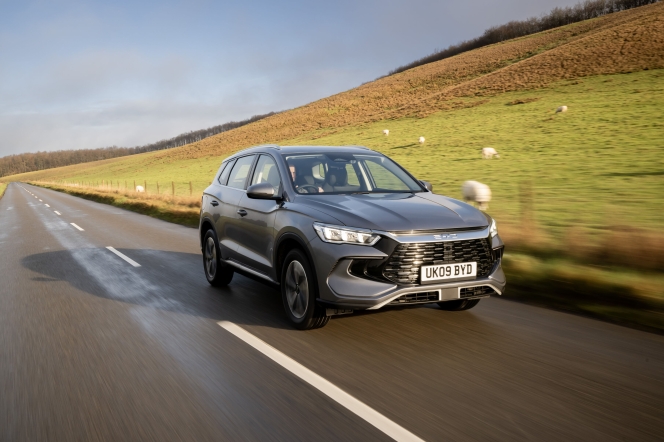
BYD, the world’s leading manufacturer of New Energy Vehicles, will once again serve as the headline sponsor for the British Vehicle Rental and Leasing Association (BVRLA) Annual Dinner in 2026. This marks the third consecutive year the company has supported the prestigious event, which is set to take place on 4 March 2026 at the JW Marriott Grosvenor House Hotel on Park Lane, London. The dinner is widely recognised as the premier gathering for professionals across the rental, fleet management and leasing sectors.
Through its ongoing sponsorship since 2024, BYD reaffirms its commitment to this vital segment of the UK automotive market. The company’s expanding presence was underscored in 2025 by the introduction of several new models, including the SEALION 7, DOLPHIN SURF, SEAL 6 Saloon and Touring and the ATTO 2. These launches contributed to significant sales figures, with 21,824 units delivered to fleet customers and 5,964 to the rental sector. The momentum has continued into 2026 with the debut of the SEALION 5 DM-i, while the ATTO 2 DM-i and ATTO 3 EVO are expected to arrive shortly. Supporting this growth is a dedicated UK fleet team of 11 specialists, offering tailored product and service expertise.
The BVRLA represents around 1,000 member organisations, ranging from SMEs to large public companies, all operating within or alongside the UK’s vehicle rental and leasing industries. By engaging with government and upholding professional standards, the association enables its members to provide safe, sustainable and accessible transport solutions. This year’s Annual Dinner will feature the presentation of the Industry Hero Awards and live entertainment from award-winning comedian Tom Ward, celebrating excellence across the sector.






Comments (0)
ADD COMMENT